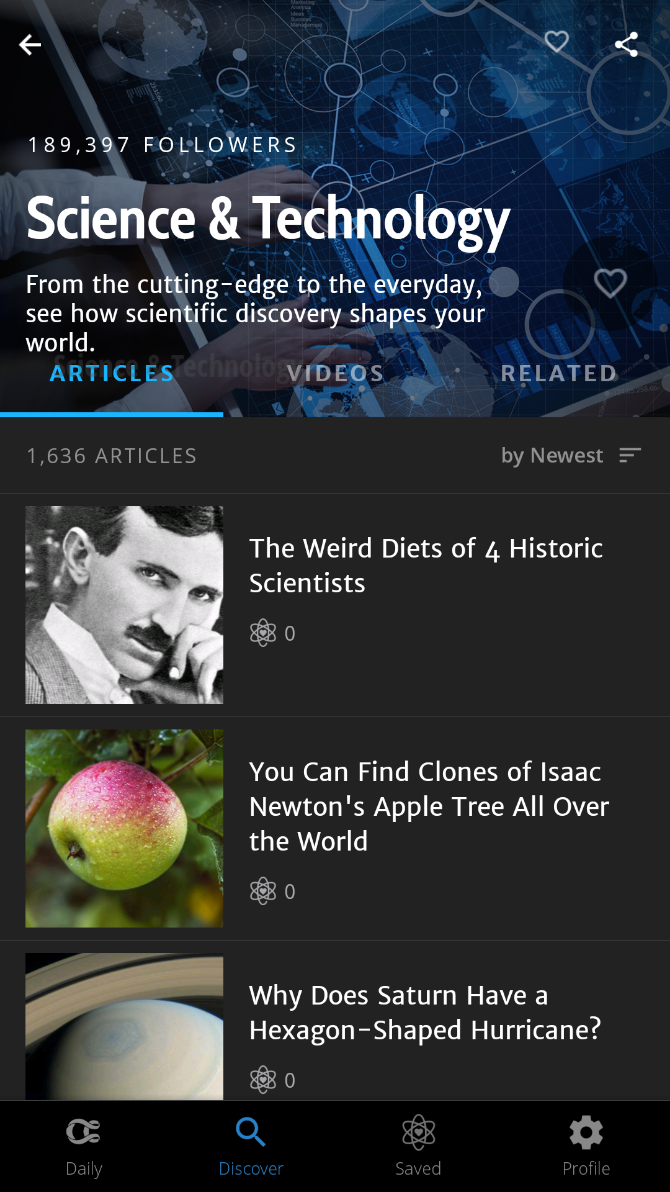
Science is fascinating, but also often confusing. It can also get a bit embarrassing to ask someone about basic scientific facts or ideas that we assume every other adult knows. So here are a few sites and apps that explain science in simple terms that anyone can understand.
Needless to say, this list won’t include some of the more famous options like How Stuff Works, Stack Exchange, or other websites for scientific questions and answers. You probably already know about those. Instead, this list is about learning or re-learning the basics in a fun, easy, or novel way, which doesn’t make you feel dumb.
Explain That Stuff (Web): Complex Science Made Easy

Chris Woodford, author of Atoms Under The Floorboards, specializes in taking complex subjects and explaining them in simple ways. You don’t need to buy the book right now though, you can read 450 of his articles (including photos and illustrations) for free online.
Explain That Stuff is, for the lack of a better comparison, the simpler version of How Stuff Works or Wikipedia. Woodford’s style of writing is less complicated than what you’ll find on other sites, and the conversational explanations (along with the great images) make it much easier to understand topics.
Unfortunately, the site isn’t updated regularly any more; Woodford has only published three new articles in 2018. That said, the content on it already is enough to keep you occupied for hours.
It’s Okay To Be Smart (YouTube): Quick and Simple Science Videos
Joe Hanson’s web series It’s Okay To Be Smart isn’t new, but it has changed a bit since we last talked about it in a roundup of the best places to watch educational videos online. Hanson has become a YouTube star in his own right, and so has the show, which means you get better production quality and some cool guest stars including the likes of Al Gore.
The range of subjects covered at It’s Okay To Be Smart is what makes it special. Every video has a scientific bent to it, but the actual subject can vary from Disney princesses to what DNA looks like.
Hanson’s videos have also become slightly longer, with most of the good ones clocking somewhere between seven and nine minutes. It’s not a big deal and you’ll be entertained throughout, but they aren’t as succinct as they used to be. But hey, you learn more, so stop complaining!
My Fav Scientist (YouTube): Quick Talks About the Greatest Scientific Minds

YouTube star Brady Haran is renowned for his smart video channels like Numberphile and Periodic Videos. What you might not know is that he also makes fantastic learning channels for kids. Fav Scientist might have a kiddish theme, but it’s suitable for all ages.
In this series, Haran talks to science professors at the Nottingham Trent University about their favorite scientists. The videos are obviously staged, but they are educational and fun nonetheless. From Michael Faraday to Star Trek’s Mister Spock, these professors have some cool choices and justify them too.
I particularly wanted to mention this little channel or mini-site because of what it brings to the discussion around science. As humans, we gravitate towards stories, not facts. You will learn and remember a lot more about scientific concepts if you know the story of the person who discovered or invented something, and the whole process of it.
Curiosity (Android, iOS): Refresh Old Scientific Ideas, and Learn New Ones
Curiosity.com is a pretty famous website with its constant updates about new findings. The thing is, when it comes to science, you don’t always want to know new findings. It’s just as beneficial to get a quick refresh of an old concept, or learning something the rest of the world already knows. The Curiosity app is actually great for this.
In the app, go to the Discover tab and look at the many categories. Of course, choose Science and Technology first, but feel free to add more to things you want to know about. Each category has articles and videos to learn more, and you can save them for later too.
Curiosity also serves up a daily topic that tackles something topical, and actually gives you deep insight about it. These articles are backed up with scientific studies, and often include counterpoints too.
Download: Curiosity for Android | iOS (Free)
Extreme Science (Web): Science You Didn’t Know That You Wanted to Know

Do you know what the deadliest creature in the sea is? Nope, it’s not a Great White Shark. You might be surprised to know that the thing you should be most scared of is the Sea Wasp or Marine Stinger, a type of jellyfish.
For such details and more, Extreme Science should be your go-to destination. The website has been around since 1998, but somehow it has gone under MakeUseOf’s radar till now, and perhaps yours too. But hey, better late than never.
The site is divided into easy sections to browse, like animal kingdom, earth, ocean, resources, space, time, weather, and science tutors. Go to any section to read the best articles there, ranging from the world’s biggest snake to the hottest place on earth. Each topic is explained in simple language, which is a welcome change from the kind of robotic drivel on Wikipedia.
Extreme Science also has plenty of photos, videos, and other multimedia to illustrate the topics they write about. But it’s mainly a text site to read and understand something thoroughly, and then impress your friends with your knowledge. But so what if it’s just text? It’s still as entertaining as some of the best science TV shows on Netflix.
Read Science News Without Jargon
Through these many sites and apps, you should be able to refresh the basics of scientific concepts, or learn anything you didn’t know. But that doesn’t mean you ignore any new findings.
Yes, right now, science news is kind of broken. When you try to read it, it’s filled with jargon and assumes you know quite a bit about the subject already.
But don’t worry, there are places that simplify even the news you want to read, stripping all the complicated words and concepts. Here are the best sites for science news that laymen can understand.
Image Credit: Elnur_/Depositphotos
Read the full article: Science Made Simple! 5 Sites and Apps That Explain Complex Topics




